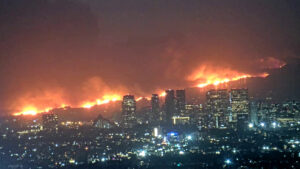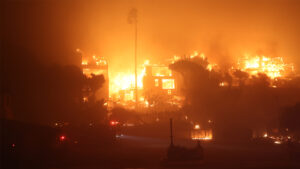By Doug Specht, University of Westminster
The Los Angeles wildfires have exposed a controversial practice that starkly illustrates the divide between the city’s wealthy elite and the general population. As public firefighters struggle to cope, affluent residents and businesses have turned to private firefighting services to protect their properties.
This trend has ignited a heated debate about inequality, the allocation of finite disaster defense resources, and the ethics of privatizing essential emergency services. We already see the effects of privatization of water and food in times of drought, with life-supporting items being unevenly distributed between rich and poor.
As climate breakdown continues, further privatization could, for example, see sandbags be bought up in bulk and deployed by corporate rescue teams, leaving poorer areas of cities flooded. Or even extreme measures such as private aircraft creating artificial clouds through a process known as cloud seeding to induce rain over affluent areas.
Demand for private firefighting services in California has been steadily increasing for a while, as the rich get richer and more frequent and intense wildfires put unprecedented pressure on public fire departments.
Owners of expensive properties in fire-prone areas seek additional layers of protection for their investments, including round-the-clock monitoring and preventative measures that go beyond public services.
Additionally, many insurance providers now offer private firefighting services as part of premium policies or hire private firms directly to protect insured properties, viewing these as cost-effective ways to minimize their potential losses (by one estimate, the recent LA fires will cost more than $200 billion).
A growing divide
The contrast between areas protected by private firefighters and those relying on public services is stark and troubling. In some affluent LA neighborhoods, private firefighters stand guard in front of untouched mansions, while thousands of homes nearby have been reduced to ash and rubble.

This disparity was brought into sharp focus when one real estate developer took to social media begging for private firefighters to protect his home “at any cost”. His pleas attracted widespread criticism and were ultimately not successful, with his multimillion-dollar property succumbing to flames in the days following his post.
The price of private firefighting services varies widely, ranging from $2,000 to $15,000 per day). Some companies offer annual retainers, such as the $7,500 yearly fee for All Risk Shield.
The cost of private firefighting services, or even fire protection insurance, is beyond the reach of many citizens. This creates a significant gap to the risks faced by the poorest members of the population, who are also the most vulnerable to climate change-related extreme weather. The privatization of responses to disasters will only increase this vulnerability.
Ethical concerns and public backlash
The proliferation of private firefighting services has sparked public outcry. Critics argue this trend exacerbates existing inequalities and potentially undermines the principle of community-wide protection during emergencies.

It’s not hard to envisage the creation of a fully two-tiered system, where access to safety becomes a privilege of wealth rather than a universal right, and where certain homes would be protected over others based solely on financial means.
The relationship between private fire crews and public fire departments is also complex and often tense. While private crews can alleviate some of the burden on overwhelmed public services, there are valid concerns about coordination, jurisdiction, and potential interference with public firefighting efforts.
To keep this in check, California passed a law in 2018 that limits how private firefighters can operate. They are not allowed to use flashing lights or badges similar to those of public firefighters, and must coordinate with them.
Since this legislation came into force, some companies have refused to serve individual people, and instead are hired by cities or insurance companies. The 2025 fires are likely to see LA’s wealthy lobby for a change to this law to make access to private help easier.
Privatizing the response
The rise of private firefighting raises critical questions about the future of disaster response in an increasingly unequal society. The January 2025 fires have also underscored the growing divide between LA’s wealthiest residents and those who will struggle to ever rebuild.
While private firefighting services offer undeniable benefits to those who can afford them, their increasing prevalence raises important questions about equity, resource allocation, and the very nature of community safety.
As climate change continues to exacerbate extreme weather events around the world, it is clear that innovative solutions are needed to protect all residents, regardless of their economic status. The challenge lies in finding a balance between allowing individuals to protect their properties, and ensuring essential emergency services remain accessible to all members of society.
Ultimately, the debate serves as a stark reminder of the broader inequalities that persist in our society. As we grapple with the increasing frequency and intensity of natural disasters, it is crucial that we work towards solutions that prioritize the safety and wellbeing of all community members, not just those who can afford to pay for additional protection.![]()
Doug Specht is a reader in cultural geography and communication at the University of Westminster.
This article is republished from The Conversation under a Creative Commons license. Read the original article. Banner photo: Firefighters battle a wildfire in California (iStock image).
Sign up for The Invading Sea newsletter by visiting here. To support The Invading Sea, click here to make a donation. If you are interested in submitting an opinion piece to The Invading Sea, email Editor Nathan Crabbe at nc*****@*au.edu.



